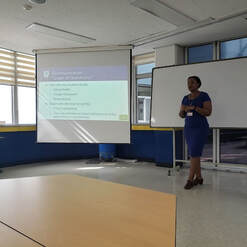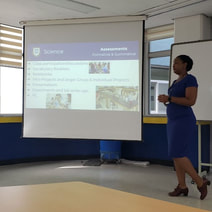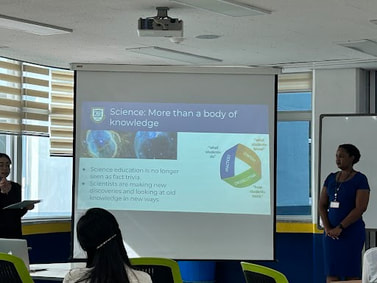 As a teacher on the grade 6 team I was delighted we were given time to meet with parents to help them and their students with the transition from elementary to middle school. This transition can be exciting and scary for both students and their parents. Forging strong partnerships between educators and parents at this time is very important. One of the highlights of our meeting was the opportunity to discuss the grade 6 curriculum and teaching philosophy. The team's commitment to fostering a dynamic and engaging learning environment was met with enthusiasm. We believe that every student is unique, and our aim is to nurture their individual strengths while guiding them towards growth in all aspects of their lives. As the science teacher I spoke about the Next Generation Science Standards (NGSS). The NGSS framework represents an exciting shift in how we approach science education. It encourages critical thinking, exploration, and a deeper understanding of the world around us. By embracing this approach, we aim to equip your children with the skills needed to thrive in an ever-evolving world. It's about going beyond rote memorization by encouraging students to question, investigate, and apply their knowledge. This approach empowers them to develop essential skills such as problem-solving, communication, and collaboration – skills that extend far beyond the classroom. Remember your student needs you more than ever at this point. Continue to provide them with support and stay connected with your child’s teaching team. How can parents help your child be successful:
0 Comments
Wow! It's been quite a while, and so much has happened in the world since September 2019 (my last post). I almost don't know where to start.
I am the mother of a high school graduate (Class of 2020). Yeah! But he was unable to attend his chosen university (boo! Pandemic). So he decided to take a gap year (which I think makes him sound very posh). He has used this year to continue to work on his art skills. He's taking French classes in preparation for making his move (name it and claim it) to an art academy there. In the next month or so, he should be hearing back from the schools. We no longer live and China. We are now residents of Turkey. I am attempting to learn Turkish (we will see how it goes). I know some of you may be thinking that I decided to leave China because of Co-Vid19, but the decision to move to Turkey was made before the outbreak. Moving across the world (twice during a pandemic) was a bit daunting. We made it safely with no significant incident (canceled flights and long layovers aside). Being a teacher at a new school in a new country is always a challenge. And I sure picked a doozy of a year to make the change. This past year has been tough (to say the least). I have yet to meet my students properly. It has been challenging building relationships with the kids, their parents, and even my fellow teachers. This school year has been very isolating for everyone. I try to give every child the time to talk, share jokes, and show pets. In Turkey, children (and the elderly) are on a much stricter lockdown (only allowed out during a four-hour window). Not only are kids not getting social interactions from school it is also much more difficult for them to engage with people outside of their households. The word on the street is starting next month; some grades will start back with in-person school (families may decide to opt-out), but this may change. I'm off to finish dinner. Be smart, stay safe, and I wish you good health. Today is Saturday, and I am at school. What?! I know, but it's not really what you think. I mean don't get me wrong I do have a pile of lab reports I need to grade, but the real reason I am at school is that I need to use a reliable VPN service. I live in China, and my school (actually the entire country) is off for the week (Yeah! National Holiday). Due to the National Holiday, China is currently cracking down on the use of VPN services. A VPN or virtual private network is a service that takes your Internet connection and makes it more secure, helps you stay anonymous and helps you get around blocks and access censored sites.* VPNs allow those of us who live in China to access sites that are behind the Great China Firewall. From time to time, the government will crackdown on the use of VPNs, which tends to make the lives of expats a little more complicated (or at least more frustrating). But even with the issues like VPNs and visas, I have found a life abroad that I love and that I don't ever want to give up. Living in China these past four years has allowed my son to receive a world-class education, has afforded us the ability to travel around the world, and allowed me to obtain an advanced degree (see also travel). I have had the opportunity to grow as a teacher and a teacher leader. I have the freedom to teach students, not just content but life skills. I looked into teaching abroad because I was about to give up on the educational world altogether. I was extremely frustrated with discussions of bubble students and practice test for the practice test. I didn't feel like I was educating young people, and instead, I felt like I was preparing test-takers. While no school is perfect, I landed in the school that allowed me to be the sort of teacher I wanted to be. Over the years, I have had a few stateside teacher friends ask me about teaching abroad. Last year my roommate and I did a video series answering some of your possible questions. Check out the videos. If you are looking for a position for the 2020-21 school year, now is the time to start your search. *https://whatismyipaddress.com/vpn https://en.wikipedia.org/wiki/Great_Firewall In the world of international teaching, you often get to practice using the word goodbye. The end of the first semester has come and gone, and as both a parent and a teacher, I have to help the students in my care deal with the loss of classmates and friends.
The companies that bring families to our school from countries all over the globe often make the decision to end an employees time abroad before the start of the new year. This means that the winter holiday while greatly anticipated is also a time for tearful goodbyes. For many people making friends can be tough and with the frequent changing of the student body some students can be reluctant to make an effort to make friends when they may be gone in a year (sometimes even sooner). I have talked to a few students recently about the difficulty of making and maintaining friendships within a small international school setting. They stated that the fear very significant possibility of friends moving away makes them hesitate to form bonds. But, what is high school without close friends to laugh and hang out with? One of the things I look back on with joy when I think about my high school years were the three girlfriends I walked the hallways of East High with. Having a group of friends is essential to the mental health and wellbeing of everyone, especially students in an international school who may be away from everything that is culturally familiar. As a teacher, I try to have a classroom culture and fosters positive peer interaction. Allowing students to chat (about off topic things) both to me and with peers. Chatting with students during off times (at lunch, in the hallway) helps me learn more about them and may allow me to help them to make connections with another student. i.e., I know that student A is really into fashion and I learn by chatting with student B that he is also into fashion. I can use that knowledge to play friend matchmaker. (I usually do this with new students or students who are having trouble making friends.) Loss is inevitable and being in the world of international schools means that you are always saying goodbye to old friends and welcoming new friends. As a teacher, I try to be there to support students when they are dealing with the loss of a friend, and I encourage them to be open to meeting new friends. As the first quarter comes to a close, I find myself stopped in the hallway by students who are looking for an increase in their grade. The majority of these students have shown that they understand the standards and concepts and have C's, B's or even A's to prove it. But for some of these students, anything less than an A plus is a sign of failure. Today I had a discussion today with one of my classes about the meaning of success. For them, success meant getting into a good college (top ranking) and having a high paying job as an adult. They were surprised that even top-ranking Harvard accepts students who haven't made all A's and having a perfect SAT score isn't required to get into Yale (below I have linked an article "Why a Perfect SAT Score Can Keep You Out of Harvard"). Colleges and universities are looking for students who are creative and have a passion for learning (not just remembering). School is about so much more than what your grade is on a test or report card. Unfortunately for most students grades are still apart of the equation, but as a teacher, I strive to help my students develop those soft skills (organization, time management, the ability to have a discussion, etc.) that will help them be genuinely successful human beings. I work to engage my students in more discussion about the importance that should or should not be attached to grades. I want my students to be lifelong learners not forever grade attainers.
For the second quarter, I am implementing a required sign up a system for students wanting to meet about grade concerns. My hope is twofold with this one that this system will require students to stop and think about any request for grade adjustments and two when we do meet I will have more opportunities to discuss the relative unimportance of grades.  Next Monday, September 24th, is the Chinese Mid-Autumn Festival (zhong qiu jie) which is one of the most important festivals in China. According to the Chinese lunar calendar, the 15th day of the 8th month is the exact middle of autumn; hence it is called the Mid-Autumn Festival. It is an evening celebration when families gather together to light lanterns, eat moon cakes and appreciate the round moon. I work to remember to have celebrations with my students. To celebrate both the large and the small, the success and the failure. Often teachers (or at least me as a teacher) get caught up in the things that have to happen (the standards, paperwork, and the bulletin boards), and we lose sight of the small successes that occur in our classrooms every day. Today in biology class we did a reading comprehension exercise. In this class, many of the students are experiencing an American style (English only) education for the first time. As we did, a whole class read out-loud many of the students were hesitant to read, because they did not know how to pronounce some of the words. After a short speech of encouragement that assured the reluctant students that the class works as a team, I was able to get two of the most hesitant students to read out loud. After each girl read her paragraph the class burst into applause. We all celebrated their success. While my students are not biological families, I am working to ensure that we build a positive school "family" environment where everyone feels safe enough to read a difficult passage and to ensure that we also celebrate everyone's successes. Not every celebration has to include moon cake or a lantern, but it is important to cultivate a culture of celebration in the classroom. As the first week of the 2018 - 2019 school year is finishing and I think back to what I have accomplished as a teacher this week. I would have to say not much. At least not much in the way of teaching science content. This week has been about getting to know the new kids and getting to (re)know the old ones. In my 6th-grade advisory class, we have set goals for the quarter (my goal is to have a weekly average of 10,000 steps). The students in my advisory are hard working and eager. I am excited to be able to see the start of their journey as upper school students. In physical science and biology, students worked to set classroom norms. Some of these included keeping the room at a warm temperature, having fun in class, and having an open mind. The kids worked to together, engaged in some discussion, and made posters to keep their class norms insight and on their minds. While the science teacher in me is ready to get into the lab and to get started on some serious science, building relationships and a positive class culture will help to ensure we have a great school year. In Rita Pierson's TED Talk she stated: "Kids don't learn from people they don't like." I have no false illusions that every student I teach will like me. Yet, I do strive for my classroom to be a safe place for every student. I look at the first week (or so) of school as a time to start to forge those relationships with students. To let them see that although I may not be their favorite person I am a person who has their best interest at heart, and most importantly I care about each and every student I encounter throughout the day as not just a student but as a person. This summer while in Prague I was asked by a professor to write a TED Talk style piece on the reason I teach. I enjoy teaching, but I had a difficult time finding anything of importance to say about the things that keep me showing up to school each and every day (outside of the things that all teacher say: love for the students, seeing the light bulb of understanding going off, etc.). I wrote a few drafts, but none of them seemed anything more than recycled cliches. During my hour long commute to class on the day, the assignment was due I was still unsatisfied with my talk. I thought about who I really am as a person and the impact that has on how and why I teach. The video below is the result of that Friday bus ride. |
Jamie HartA teacher from the United States of America, currently teaching abroad. I teach science to middle and high school students. I enjoy reading and doing nerd things. Archives
April 2023
Categories
All
|





 RSS Feed
RSS Feed
